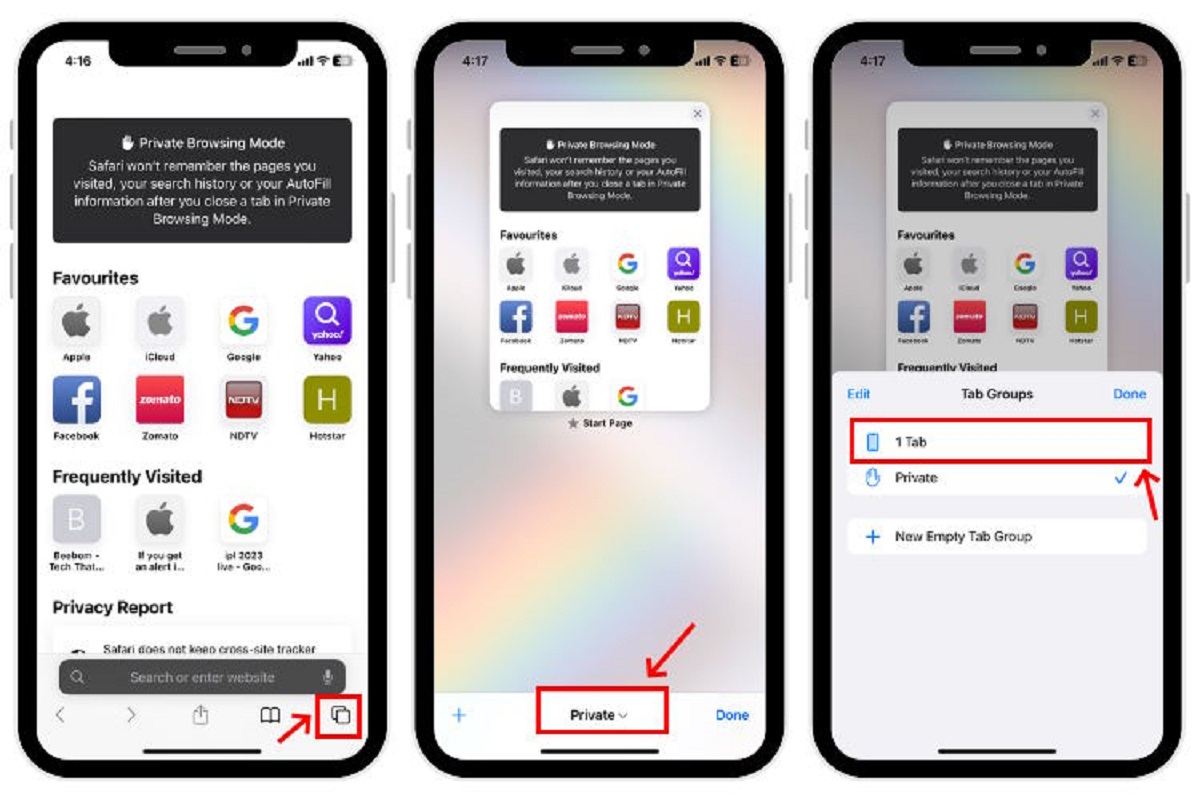Introduction
When you open your beloved Firefox browser, you expect it to greet you with a single, pristine tab, ready to embark on your online journey. However, there are instances when Firefox surprises you by opening not one, but two tabs. This unexpected occurrence can leave you scratching your head and wondering, "Why does Firefox open two tabs?"
The phenomenon of Firefox launching two tabs upon startup can be perplexing, but fear not, for there are several reasons behind this behavior. Understanding these reasons can shed light on the inner workings of your browser and help you navigate through this seemingly mysterious occurrence.
In the following sections, we will delve into the various factors that can lead to Firefox opening two tabs. From the tab session restore feature to the influence of add-ons or extensions, crashes, restarts, and the impact of external links or protocols, we will unravel the intricacies of this phenomenon. So, let's embark on this enlightening journey to uncover the reasons behind Firefox's tendency to open two tabs and gain a deeper understanding of our beloved browser's behavior.
Tab Session Restore Feature
The Tab Session Restore feature in Firefox is designed to enhance user experience by preserving the state of your browsing session. This means that when you close the browser with multiple tabs open, Firefox remembers the tabs and reloads them the next time you launch the browser. This feature is incredibly useful, especially for those who work with numerous tabs simultaneously or tend to revisit specific websites regularly.
Now, you might be wondering how the Tab Session Restore feature relates to the scenario of Firefox opening two tabs. Well, the answer lies in the way Firefox handles the restoration process. When you close the browser with multiple tabs open, Firefox stores information about these tabs, including their URLs and the state they were in, such as whether they were pinned or playing media.
Upon relaunching Firefox, the browser attempts to restore your previous browsing session by opening the tabs you had open before. In some cases, this can lead to Firefox opening two tabs instead of one. The first tab represents the default homepage or the last page you visited before closing the browser, while the second tab comprises the collection of tabs from your previous browsing session.
This behavior is a result of Firefox's diligent effort to provide a seamless and convenient browsing experience. While it may initially seem unexpected, it is a testament to Firefox's commitment to preserving your browsing history and session state. Understanding this aspect of the Tab Session Restore feature can help users appreciate the thoughtfulness behind Firefox's design and functionality.
In essence, the Tab Session Restore feature serves as a testament to Firefox's dedication to user convenience and seamless browsing experiences. By comprehending the intricacies of this feature, users can gain a deeper appreciation for the browser's commitment to preserving their browsing history and session state.
Add-ons or Extensions
Add-ons or extensions are valuable tools that enhance the functionality of Firefox, allowing users to customize their browsing experience according to their preferences. These add-ons can range from ad blockers and password managers to productivity tools and themes, catering to a diverse array of user needs. While these extensions offer immense utility, they can also play a role in the scenario of Firefox opening two tabs.
When you install and configure certain add-ons or extensions, they may influence the behavior of your browser upon startup. Some extensions are designed to open specific pages or tabs when Firefox launches, effectively augmenting the default behavior of the browser. For instance, a productivity-focused extension might be programmed to open a dedicated dashboard or task management tool upon startup, providing users with quick access to their essential tools and resources.
In addition, certain extensions may have the capability to modify the browser's startup settings, including the number of tabs that are opened when Firefox is launched. This can lead to the scenario where Firefox opens two tabs instead of the expected single tab. The influence of these extensions on the browser's startup behavior underscores the impact that add-ons can have on shaping the overall browsing experience.
Furthermore, conflicts between different extensions or compatibility issues with the Firefox browser itself can contribute to the occurrence of Firefox opening two tabs. When multiple extensions interact with the browser's startup process, it can lead to unexpected behavior, including the simultaneous opening of multiple tabs. This highlights the importance of ensuring that the extensions installed in Firefox are compatible with the browser's current version and with each other, minimizing the likelihood of conflicts that could disrupt the expected startup behavior.
Understanding the role of add-ons or extensions in influencing Firefox's startup behavior can empower users to take proactive measures to manage their extensions effectively. By reviewing the settings and behaviors of installed extensions, users can identify any configurations that may impact the browser's startup routine and make informed decisions about their extension usage.
In essence, while add-ons and extensions greatly enrich the browsing experience, they can also exert influence on the startup behavior of Firefox, potentially leading to the scenario of the browser opening two tabs. By recognizing the impact of these extensions and taking steps to manage them effectively, users can maintain greater control over their browsing environment and minimize unexpected behaviors during Firefox startup.
Crashes and Restarts
Crashes and restarts are common occurrences in the digital realm, and web browsers are not immune to these occasional hiccups. When Firefox encounters a crash or undergoes a restart, it can lead to unexpected behaviors, including the scenario of opening two tabs upon relaunch. Understanding the relationship between crashes, restarts, and the subsequent behavior of Firefox can provide valuable insights into the inner workings of the browser.
When Firefox crashes, it may attempt to restore your previous browsing session upon relaunch. This restoration process aims to bring back the tabs and windows that were open before the crash, allowing users to resume their browsing activities seamlessly. However, in some instances, this restoration process can result in Firefox opening two tabs instead of one. The first tab typically represents the default homepage or the last page visited before the crash, while the second tab comprises the collection of tabs from the previous browsing session.
The occurrence of Firefox opening two tabs after a crash or restart is a manifestation of the browser's commitment to preserving the user's browsing history and session state. While it may initially seem unexpected, it underscores Firefox's dedication to providing a seamless and uninterrupted browsing experience for its users. By understanding this behavior, users can gain a deeper appreciation for Firefox's efforts to mitigate the impact of crashes and ensure the continuity of their browsing sessions.
Moreover, the scenario of Firefox opening two tabs after a crash or restart serves as a reminder of the browser's resilience and adaptability. Despite encountering unexpected disruptions, Firefox endeavors to restore the user's browsing environment to its previous state, minimizing the inconvenience caused by crashes or sudden restarts. This resilience reflects Firefox's commitment to prioritizing user experience and striving to deliver a reliable and robust browsing platform.
In essence, crashes and restarts can trigger the behavior of Firefox opening two tabs, as the browser diligently attempts to restore the user's previous browsing session. This phenomenon underscores Firefox's dedication to preserving the user's browsing history and session state, showcasing the browser's resilience in the face of unexpected disruptions. By recognizing the relationship between crashes, restarts, and Firefox's behavior, users can gain a deeper understanding of the browser's commitment to providing a seamless and uninterrupted browsing experience.
External Links or Protocols
External links or protocols can also play a significant role in the scenario of Firefox opening two tabs. When you click on a link that is configured to open in a new tab, Firefox adheres to this instruction and opens the link in a separate tab while retaining the existing tab. This behavior is commonly observed when clicking on links that lead to external websites or resources.
Additionally, certain protocols, such as the "mailto" protocol used for email links, may prompt Firefox to open a new tab or window to handle the specific action associated with the protocol. For example, clicking on an email address link formatted with the "mailto" protocol may trigger Firefox to open a new tab for composing an email, in accordance with the designated protocol handling.
Furthermore, the behavior of external links or protocols can be influenced by the settings and configurations within Firefox. Users have the option to customize how external links and protocols are handled, allowing them to specify whether these actions should open in new tabs, new windows, or be redirected within the current tab. These settings can impact the overall tab management behavior of Firefox, potentially leading to the scenario of the browser opening two tabs when interacting with external links or protocols.
Understanding the role of external links and protocols in shaping Firefox's tab behavior can provide users with insights into the dynamics of tab management within the browser. By recognizing the impact of external links and protocols on tab handling, users can make informed decisions about their browsing habits and preferences, ensuring a more tailored and personalized browsing experience.
In essence, external links and protocols can influence the tab behavior of Firefox, potentially leading to the scenario of the browser opening two tabs. By acknowledging the role of external links and protocols in tab management, users can navigate their browsing activities with a deeper understanding of how Firefox responds to external stimuli, thereby enhancing their overall browsing experience.

























